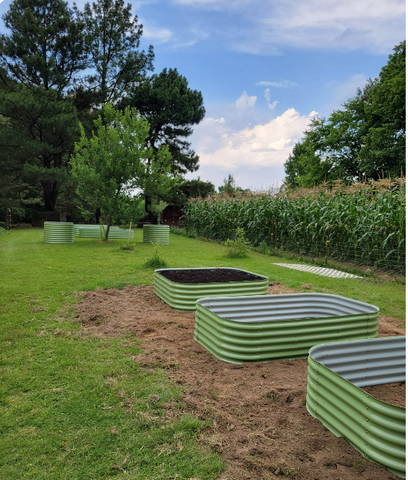Celebrating Nature's Green Giant: World Bamboo Day
Bamboo, the magnificent and versatile plant, has long been an integral part of human civilization. From towering skyscrapers to everyday household items, bamboo's utility knows no bounds. However, its significance goes far beyond its practical uses; bamboo plays a pivotal role in environmental conservation and sustainable living. To honor this incredible gift of nature, In this article from Olle garden beds, we'll delve into the fascinating world of bamboo, its rich history。
Bamboo: A Brief Overview
Bamboo, often referred to as "the green gold," is a fast-growing woody grass that belongs to the Poaceae family. This incredible plant boasts over 1,500 known species and can be found on almost every continent, except Antarctica. With its impressive growth rate, some bamboo species can grow as much as 36 inches in a single day!
The Versatility of Bamboo
Bamboo is celebrated not only for its speed of growth but also for its unparalleled versatility. Here are some of the many ways bamboo is used:
Construction: Bamboo is often used in construction for scaffolding, bridges, and even entire buildings. Its strength-to-weight ratio makes it an ideal building material.
Furniture: Bamboo furniture is known for its durability, style, and eco-friendliness. It's commonly used for tables, chairs, and cabinets.
Textiles: Bamboo fibers are used to create soft, breathable, and moisture-wicking textiles. Bamboo fabric is a sustainable alternative to cotton.
Paper: Bamboo pulp can be used to make paper products, reducing the demand for traditional wood pulp and minimizing deforestation.

Culinary: Bamboo shoots are edible and are used in various Asian cuisines. They are a rich source of nutrients and add unique flavors to dishes.
Crafts: Bamboo's flexibility and strength make it a favorite among artisans for creating baskets, mats, and decorative items.
Environmental Conservation: Bamboo's extensive root system helps prevent soil erosion and contributes to carbon sequestration, making it an excellent choice for reforestation efforts.
The Rich History of Bamboo
Bamboo has played a significant role in the cultures and traditions of various societies throughout history. Here are a few examples:
China: Often referred to as the "land of bamboo," China has a deep-rooted connection with this plant. Bamboo symbolizes strength, flexibility, and resilience in Chinese culture.
Japan: Japanese tea ceremonies often feature bamboo utensils and serving trays, emphasizing the harmony between man and nature.
India: In India, bamboo has been used for centuries in construction, especially for the creation of traditional homes and religious structures.
Southeast Asia: Many indigenous communities in Southeast Asia rely on bamboo for their livelihoods and as a key building material for their homes and tools.
World Bamboo Day: Celebrating Sustainability
World Bamboo Day, established by the World Bamboo Organization (WBO), is a global celebration dedicated to raising awareness about the immense potential of bamboo and promoting its sustainable use. Here are a few explanations for why this day is important:
Sustainable Living: Bamboo embodies sustainability, as it is renewable and can be harvested without harming the plant or the environment.
Economic Opportunities: Bamboo provides livelihoods to millions of people worldwide, particularly in rural and marginalized communities.
Environmental Benefits: Bamboo forests help combat climate change by sequestering carbon, reducing soil erosion, and promoting biodiversity.
Innovation: World Bamboo Day encourages innovation in bamboo-related industries, such as the development of new products and technologies.
Cultural Exchange: It serves as a platform for cultural exchange, where people from different backgrounds come together to celebrate and learn about bamboo.

How to celebrate World Bamboo Day
Every year on September 18th, people around the world come together to celebrate World Bamboo Day. This remarkable plant, known for its versatility and sustainability, has been a vital part of human culture and tradition for centuries. World Bamboo Day is a wonderful opportunity to learn more about bamboo, appreciate its many benefits, and join the global movement towards sustainable living. In this article, we'll explore how you can celebrate World Bamboo Day and contribute to a more eco-friendly future.
Learn About Bamboo
To truly appreciate bamboo, it's essential to understand its significance and ecological importance. Take some time to research the history, cultivation, and uses of bamboo. Discover how various cultures have integrated bamboo into their daily lives, from construction and textiles to cuisine and art. Learning about bamboo's role in sustainable agriculture and its contribution to biodiversity conservation can deepen your appreciation for this incredible plant.
Visit Bamboo Gardens and Farms
On World Bamboo Day, consider visiting a local bamboo garden or farm, if available. These spaces showcase the beauty and versatility of bamboo while providing an opportunity to observe different bamboo species and their various applications. You might even get a chance to witness bamboo being harvested or transformed into products like furniture, utensils, or clothing.
Participate in Workshops and Demonstrations
Many communities organize workshops and demonstrations on World Bamboo Day to educate people about bamboo crafts and construction techniques. Attending such events can be entertaining and educational. You might learn how to weave bamboo baskets, create bamboo crafts, or even build basic bamboo structures. These skills can be both fun and sustainable, allowing you to reduce your reliance on non-renewable resources.
Support Bamboo-Based Products
One of the most effective ways to celebrate World Bamboo Day is to support businesses and artisans that specialize in bamboo-based products. Bamboo is a highly sustainable material, and choosing bamboo over conventional alternatives helps reduce your ecological footprint. Look for bamboo products such as clothing, furniture, utensils, or even bamboo-based cosmetics and skincare items. By purchasing these products, you not only contribute to the bamboo industry but also promote eco-friendly consumer choices.

Spread Awareness
World Bamboo Day is an excellent occasion to raise awareness about the importance of bamboo conservation and sustainable living. Share information about bamboo's benefits, from its rapid growth and carbon-sequestration properties to its use in disaster-resilient housing. Use social media, blogs, or community events to inform others about the advantages of using bamboo in our daily lives and encourage sustainable practices.
Plant Bamboo
If you have the space and climate suitable for bamboo growth, consider planting bamboo in your backyard or community garden. Bamboo is a low-maintenance, fast-growing plant that can provide you with a sustainable source of raw materials for various purposes. Additionally, bamboo can help prevent soil erosion and improve air quality, making it an eco-friendly addition to your local environment.
Support Bamboo Conservation Efforts
Bamboo forests are essential ecosystems that support a wide range of wildlife and play a crucial role in carbon sequestration. Supporting organizations dedicated to bamboo conservation and forest preservation is an impactful way to celebrate World Bamboo Day. Donating to or volunteering with such organizations can contribute to the protection and sustainable management of bamboo resources worldwide.
World Bamboo Day serves as a reminder of the incredible gifts that nature offers us and the importance of sustainable living. Bamboo, with its remarkable versatility and eco-friendly properties, stands as a symbol of what can be achieved when we work in harmony with the environment. So, this September 18th, take a moment to appreciate the wonders of bamboo and consider how it can be integrated into your own life to promote sustainability and environmental stewardship. Whether you're using bamboo products, planting bamboo in your garden, or simply spreading awareness, you can contribute to the celebration of World Bamboo Day and make a positive impact on our planet.
